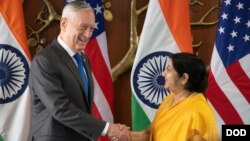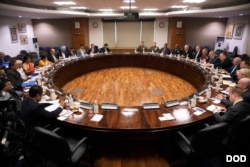The United States and India took a major step to expand defense ties Thursday, signing a deal that allows India to acquire high-end U.S. weaponry, including armed drones.
The agreement was signed during a meeting in New Delhi among U.S. Defense Secretary Jim Mattis, U.S. Secretary of State Mike Pompeo, and their Indian counterparts.
The U.S. earlier this year offered armed Guardian drones to India, but the sale could not go through until the agreement, known as COMCASA, was reached.
“The landmark agreement deepens our military to military cooperation and our ability to share the most advanced defense technology, making us both stronger,” Mattis said.
If the Guardian sale goes through, India would become the first non-NATO country to buy armed U.S. drones.
The deal reflects growing ties between the U.S. and India – the world’s two largest democracies – both of whom are concerned about China’s rising power.
Defense cooperation, in particular, has emerged as the “most significant dimension” of the U.S.-India relationship, said Indian Defense Minister Nirmala Sitharaman.
U.S.-India ties, she said, have reached “unprecedented heights.”
Iran, Russia disagreements
The U.S. and India haven’t always been this close. India, which has historically tried to be neutral in world affairs, has bristled at what it considers U.S. restraints on its foreign policy decisions.
Most recently, the U.S. has taken issue with India’s purchase of oil from Iran and its planned acquisition of a Russian missile defense system. Both moves would violate U.S. sanctions.
A Pentagon official last month threatened to impose sanctions on India if it goes ahead with its $6 billion purchase of the Russian S-400 missile defense system.
But in their public comments Thursday, neither side mentioned the Russia or Iran disputes. And the S-400 never came up in private discussions with India’s defense and external affairs ministers, said Deputy Assistant Defense Secretary for South and Southeast Asia Joe Felter.
Iran also “wasn’t a big topic,” he said.
Most of India’s weapons are Russian-made, a legacy of India’s Cold War relationship with the Soviet Union. The U.S. is currently India’s second-largest weapons supplier.
But U.S. military sales to India have expanded rapidly – going from zero in 2008 to $15 billion this year. That figure now stands to increase, with the new agreement in place.
“It comes down to trust. Some of this tech is very sensitive. Some countries we don’t want this tech to fall in the hands of," Felter said, adding the U.S. has similar agreements with less than 30 countries.
The U.S. and India also agreed to hold a new military exercise. The exercise will involve sea, land, and air forces. It will occur of the eastern coast of India in 2019.





